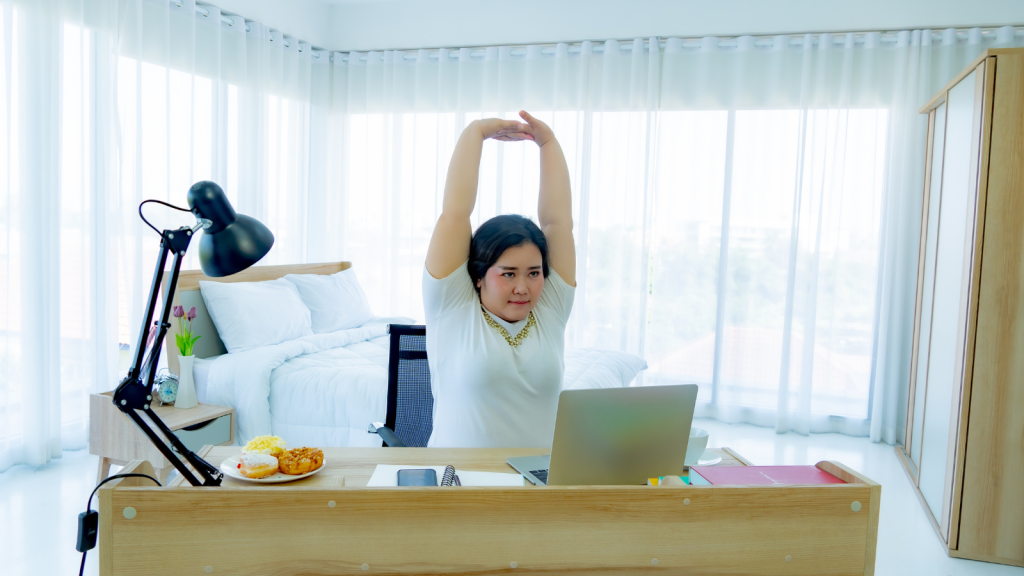In our fast-paced world, finding time for a proper workout can feel like an impossible task. But what if you could sneak in some exercise throughout your day, without even breaking a sweat? Enter micro exercises: tiny bursts of activity that can add up to significant health benefits over time. These quick and simple movements can boost your energy, improve your mood, and keep your body limber and strong. Best of all, you can do them almost anywhere, anytime, without any special equipment.
Desk Chair Squats
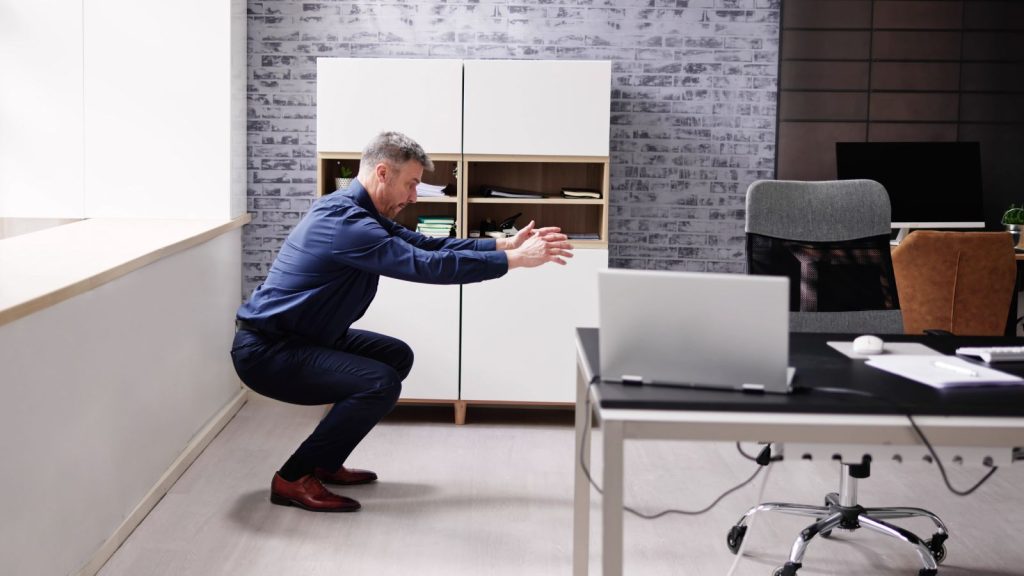
Turn your office chair into a fitness tool with desk chair squats. Simply stand up from your chair, then slowly lower yourself back down, stopping just before you sit. Hold for a few seconds, then stand back up. Repeat this 10-15 times whenever you need a quick break. This exercise strengthens your legs and core while improving your posture. For an extra challenge, try holding the ‘almost seated’ position for longer periods, gradually increasing from 5 to 30 seconds.
Stair Step-Ups
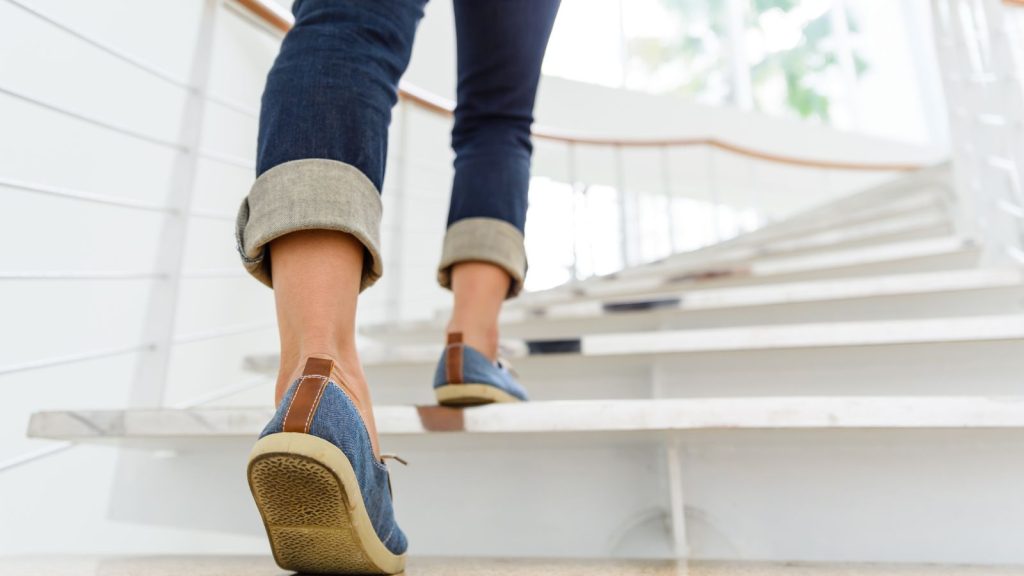
If you have access to stairs, make them your mini stepper machine. Step up onto the first or second step, then step back down. Alternate legs with each step-up. Aim for 20-30 repetitions. This simple move boosts your heart rate and tones your legs and glutes. To increase intensity, try taking two steps at a time or adding a little hop as you step down.
Wall Push-Ups
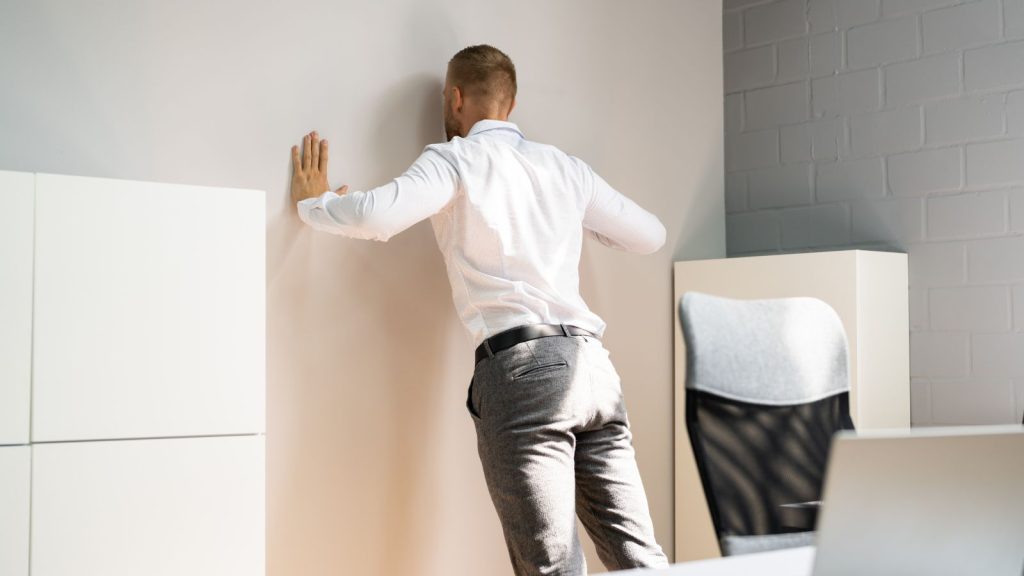
No need for the floor – use a wall for an easier version of push-ups. Stand arm’s length from a wall, place your palms flat against it, then lean in and push back out. Do 10-15 repetitions. This exercise works your chest, arms, and shoulders without straining your back. To make it more challenging, move your feet further away from the wall, creating a greater angle with your body.
Calf Raises
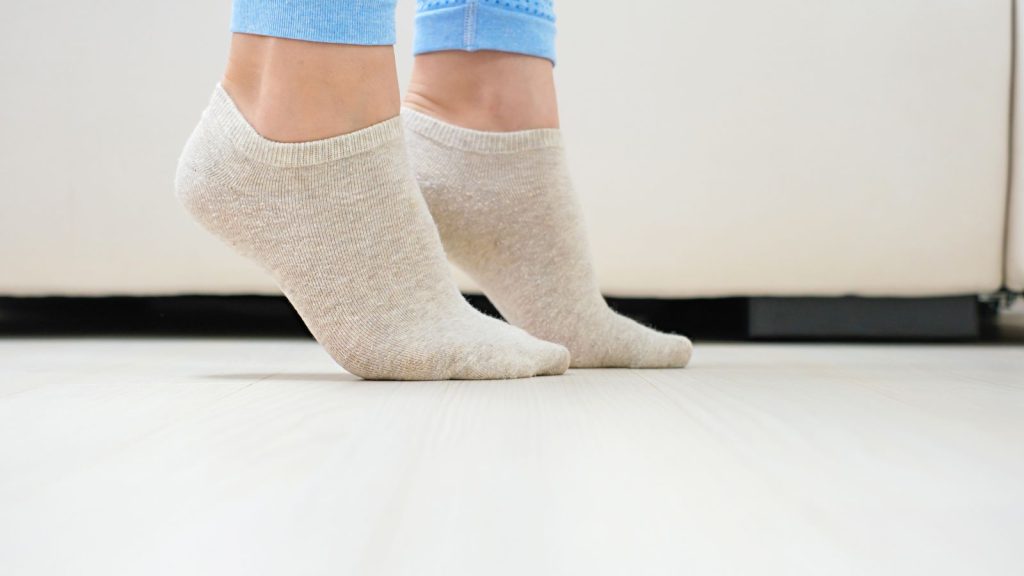
While standing in a queue or brushing your teeth, rise up onto your toes, hold for a moment, then lower back down. Repeat 15-20 times. This simple move strengthens your calves and improves balance, which becomes increasingly important as we age. For an added balance challenge, try doing these on one foot at a time.
Seated Leg Raises
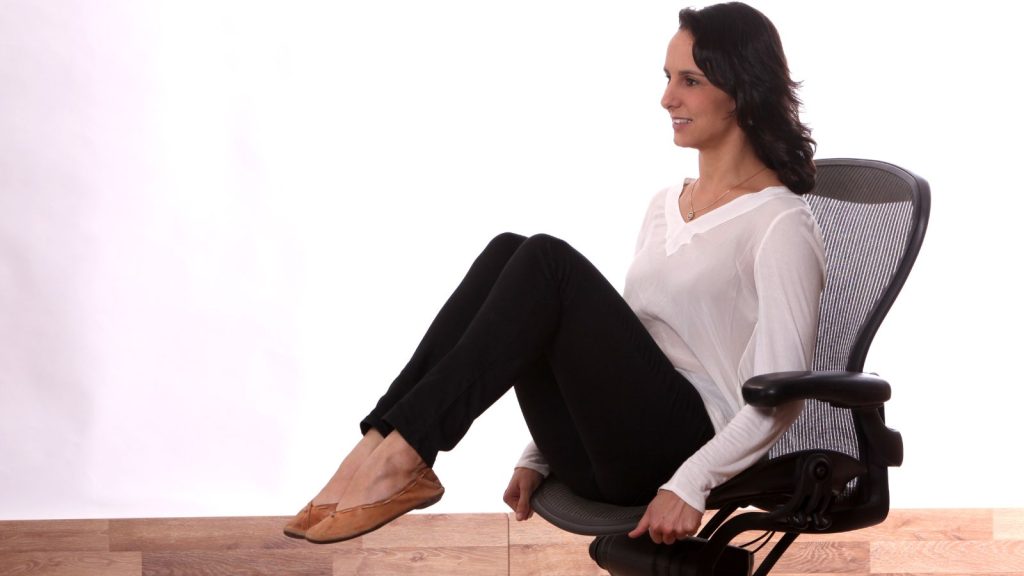
Sneak in some ab work while sitting at your desk. Sit up straight, then lift both feet off the ground a few inches. Hold for 5-10 seconds, then lower. Repeat 10 times. This exercise engages your core and can help improve posture. To intensify the workout, try extending your legs fully as you lift them.
Desk Dips
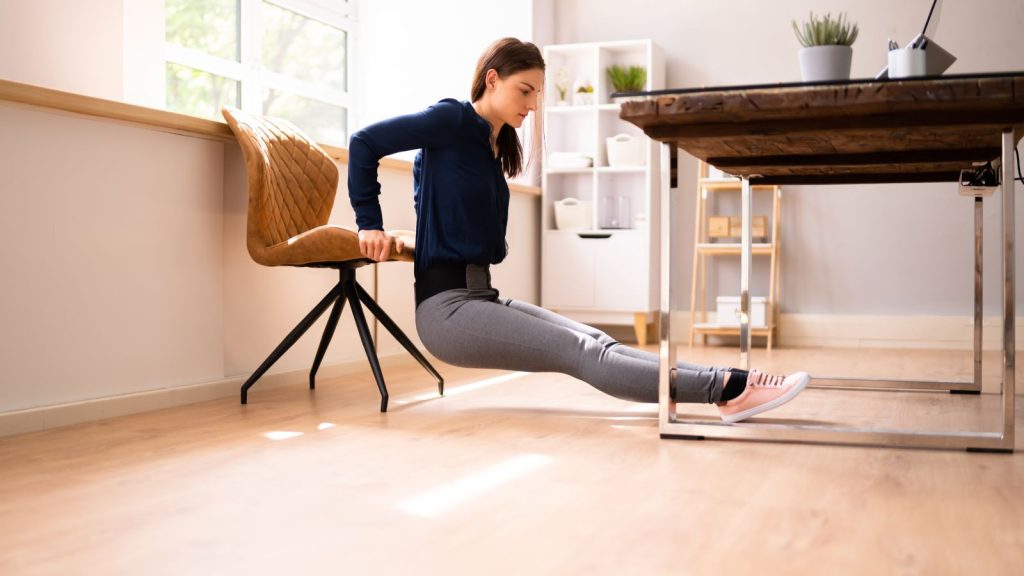
Use your desk for a quick tricep workout. With your back to the desk, place your hands shoulder-width apart on the edge. Slide your bottom off the desk and lower yourself down, then push back up. Aim for 10-15 repetitions. This move tones the backs of your arms and strengthens your shoulders. For a greater challenge, try lifting one foot off the ground as you perform the dips.
Neck Rolls

Combat tech neck with gentle neck rolls. Slowly roll your head in a circle, first clockwise, then anticlockwise. Do 5 rotations in each direction. This exercise helps relieve tension in your neck and upper shoulders, areas prone to stiffness from desk work. Remember to move slowly and stop if you feel any pain or discomfort.
Ankle Rotations
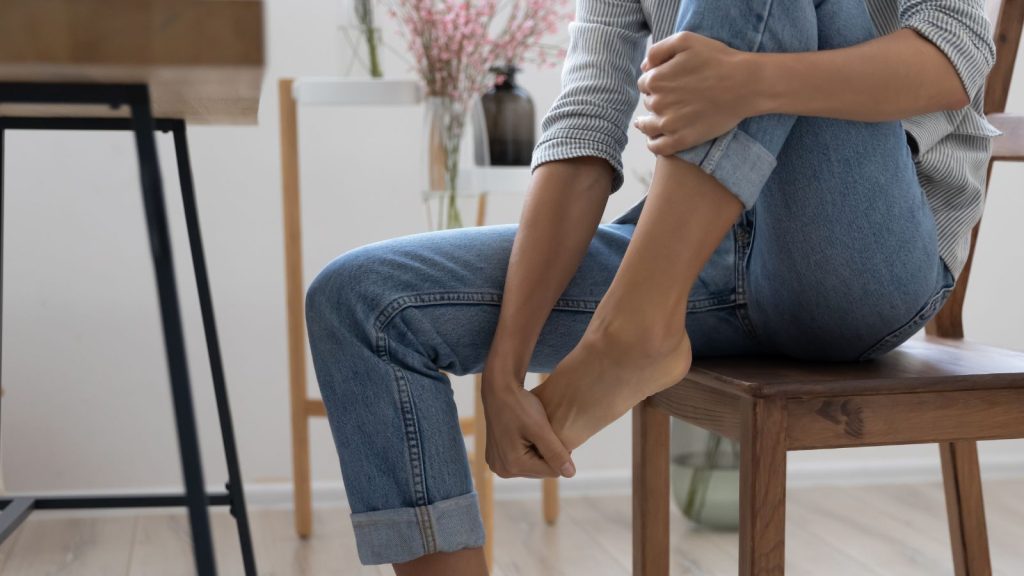
While seated, lift one foot off the ground and rotate your ankle in circles. Do 10 rotations in each direction, then switch feet. This simple movement improves ankle flexibility and circulation, especially beneficial if you sit for long periods. Try spelling out the alphabet with your foot for an extra range of motion challenge.
Seated Spinal Twist
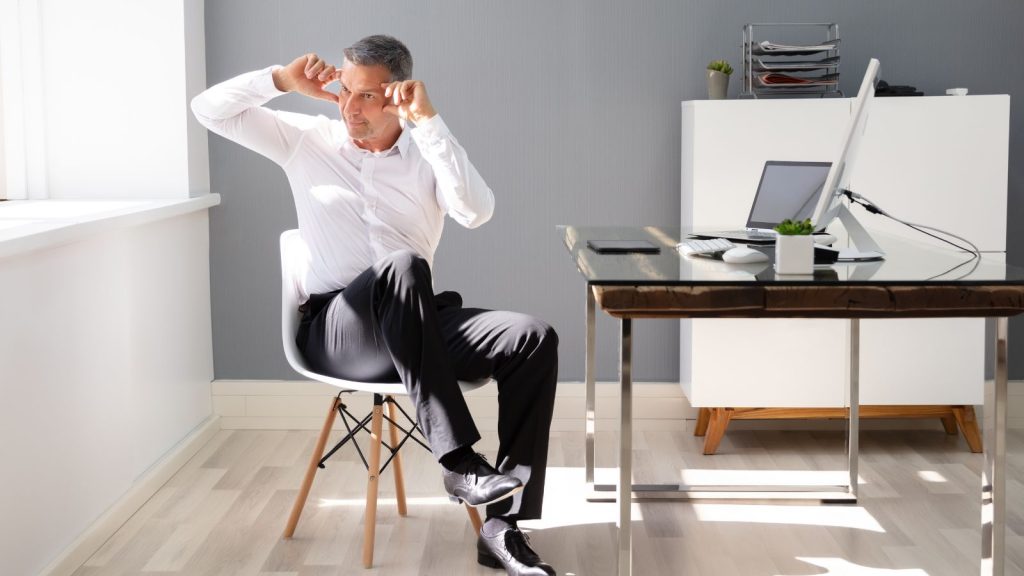
Improve your spinal mobility with a seated twist. Sit up straight, then gently twist to one side, placing your hand on the opposite knee. Hold for 10 seconds, then switch sides. This stretch can help alleviate back pain and improve digestion. For a deeper stretch, try hooking your elbow over the back of your chair as you twist.
Standing Side Bends
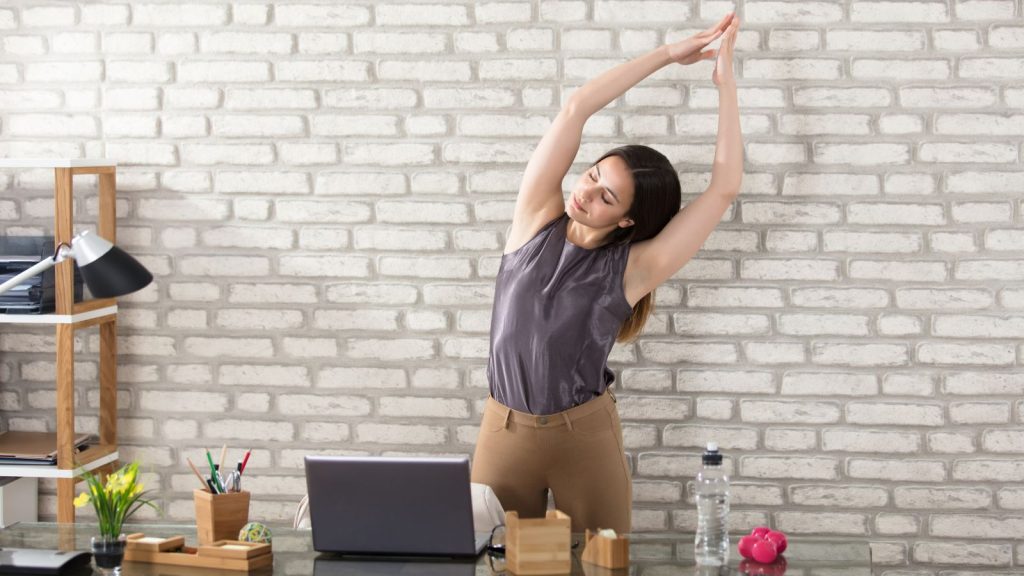
Stand with your feet hip-width apart, raise one arm overhead, and lean to the opposite side. Hold for 10 seconds, then switch sides. Repeat 3 times on each side. This stretch targets your obliques and can help relieve tension in your sides. To intensify the stretch, hold a water bottle or book in the raised hand.
Palm Push

Combat carpal tunnel with this quick hand exercise. Press your palms together in front of your chest, fingers pointing up. Push your palms against each other for 10 seconds, then release. Repeat 5 times. This move strengthens the muscles in your hands and wrists. For variety, try alternating between fingers pointing up and fingers pointing down.
Shoulder Blade Squeeze

Improve your posture with this simple move. Sit or stand up straight, then squeeze your shoulder blades together. Hold for 5 seconds, then release. Repeat 10 times. This exercise helps counteract the forward slouch many of us develop from computer use. Try to perform this exercise every hour to maintain good posture throughout the day.
Silent Heel Raises
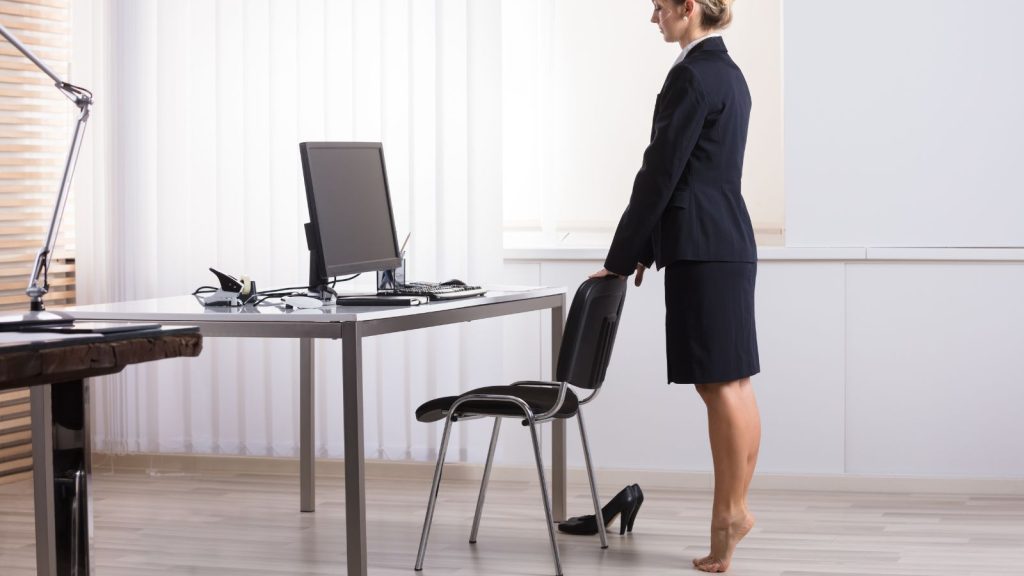
While on a phone call or in a meeting, raise your heels off the ground, balancing on the balls of your feet. Hold for 5 seconds, then lower. Repeat 15 times. This subtle move strengthens your calves and improves balance without drawing attention. For an extra challenge, try doing these on one foot at a time.
Seated Leg Extensions
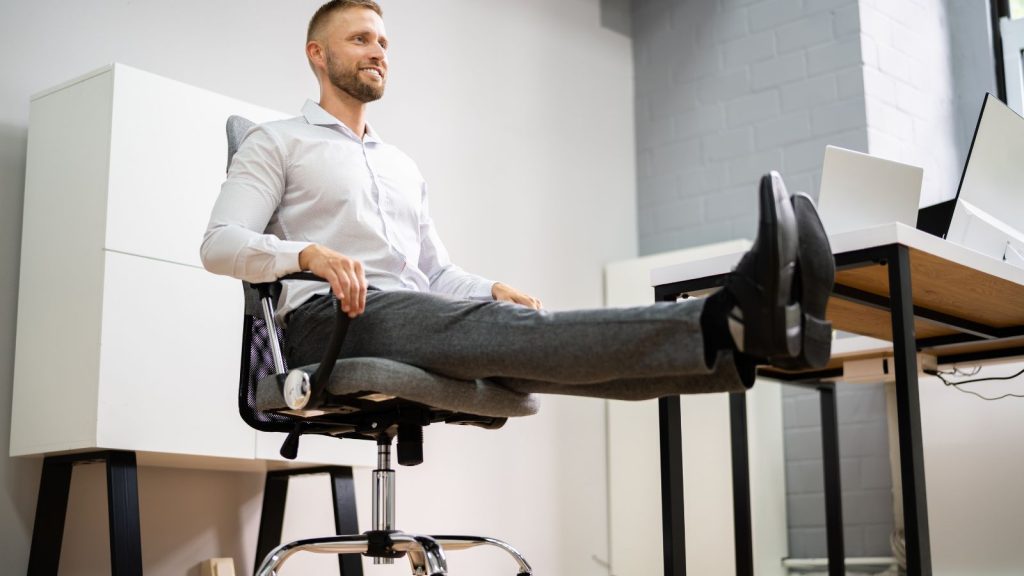
Sneak in some leg work while seated. Straighten one leg out in front of you, hold for 5 seconds, then lower. Repeat 10 times, then switch legs. This exercise strengthens your quadriceps and can help improve knee stability. To increase difficulty, hold the extended leg position for longer, gradually working up to 30 seconds.
Fist Clenches

Release hand tension with this quick exercise. Make a tight fist, hold for 5 seconds, then slowly release, spreading your fingers wide. Repeat 10 times. This movement improves hand flexibility and can be especially beneficial for those who type frequently. For added benefit, try squeezing a stress ball or tennis ball if you have one handy.
Toe Taps
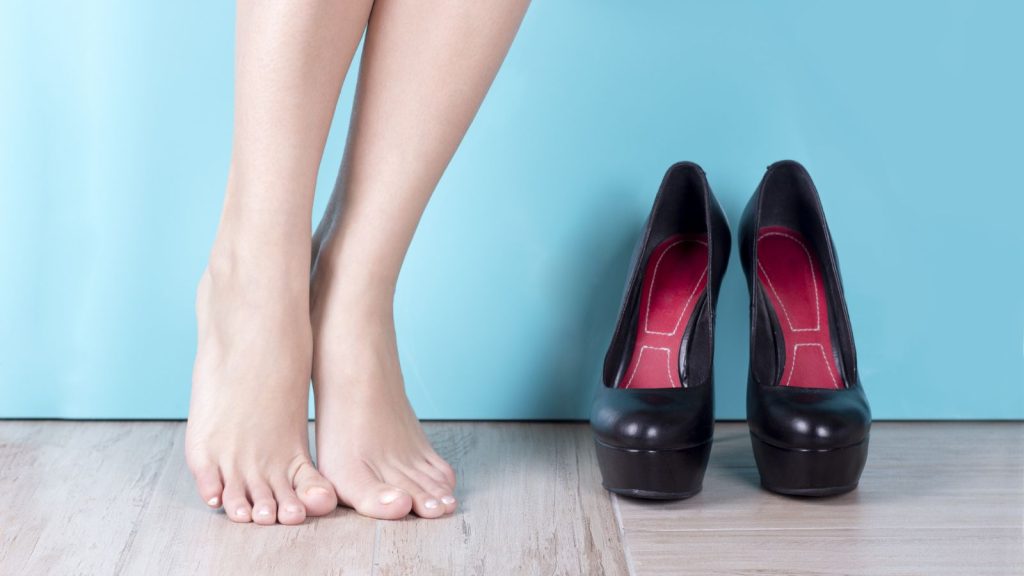
While seated, lift your toes off the ground, keeping your heels down. Then lower your toes and lift your heels. Alternate between the two movements for 30 seconds. This exercise improves foot flexibility and can help prevent plantar fasciitis, a common cause of heel pain. Try to increase your speed as you become more comfortable with the movement.
Invisible Chair Sit
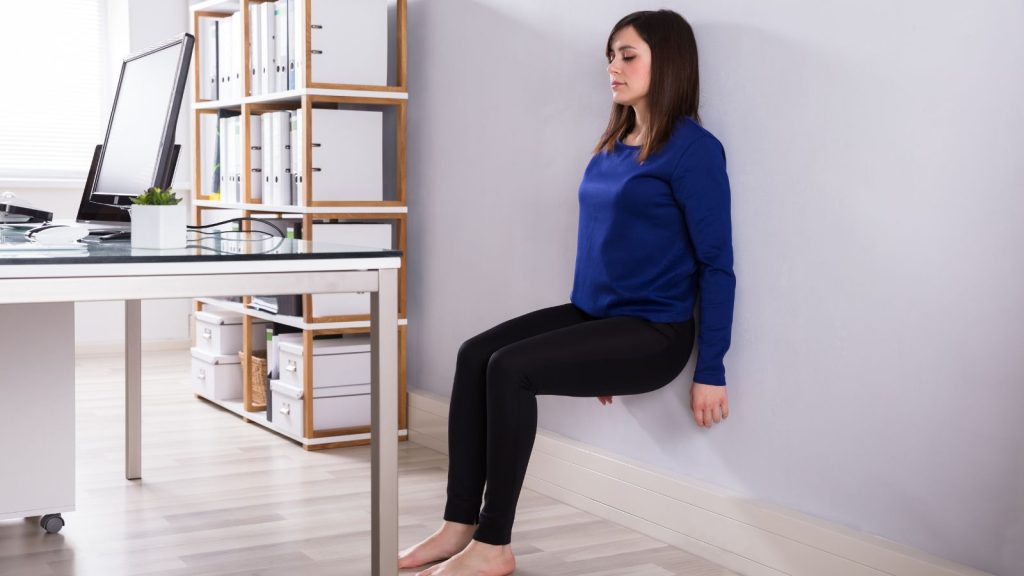
Find an empty wall and pretend to sit in an invisible chair. Lower yourself until your thighs are parallel to the ground and hold for 30 seconds. This isometric exercise strengthens your quadriceps and core without any equipment. As you build strength, try to hold the position for longer periods, aiming for up to 2 minutes.
Desktop Plank Hold
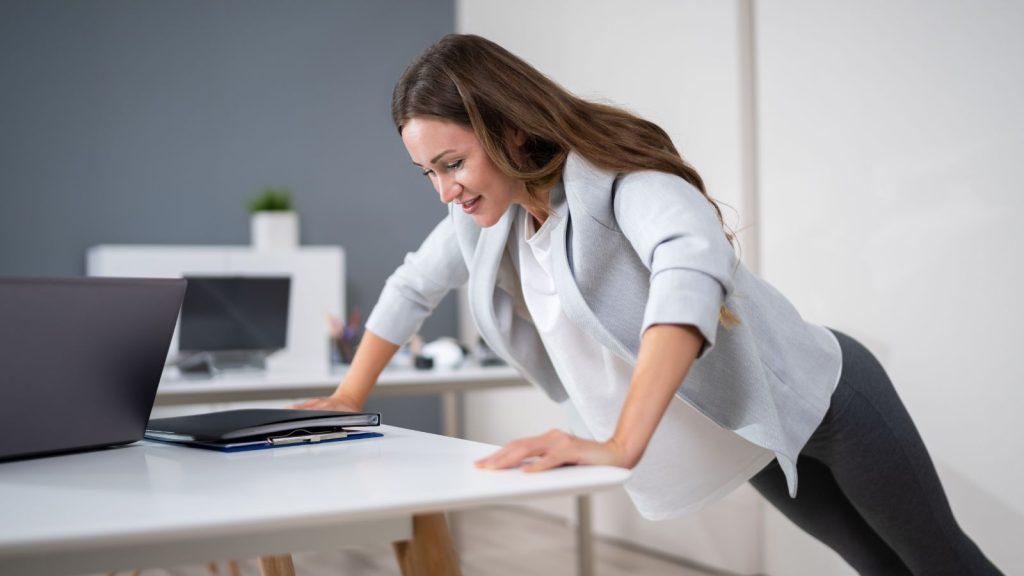
Place your forearms on your desk, step your feet back, and hold a plank position for 20-30 seconds. This modified plank engages your core and improves overall body strength without requiring you to get on the floor. To increase difficulty, try lifting one foot off the ground while holding the plank position.
Wrist Flexor Stretch
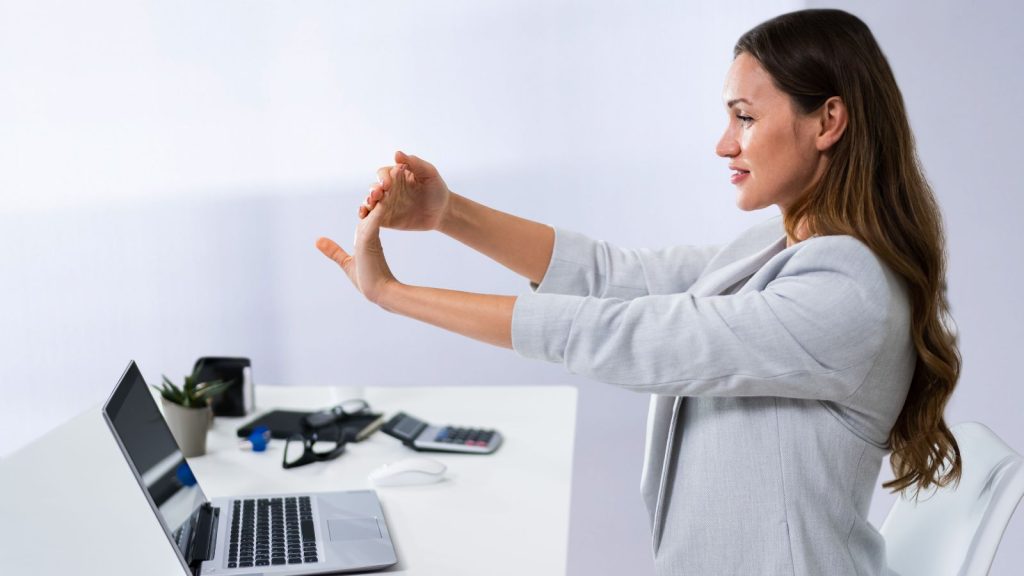
Extend one arm in front of you with the palm facing up. Use your other hand to gently pull the fingers back towards your body. Hold for 15 seconds, then switch hands. This stretch helps prevent repetitive strain injuries common in office workers. For a deeper stretch, try doing this with your arm extended to the side, parallel to the ground.
Seated Piriformis Stretch
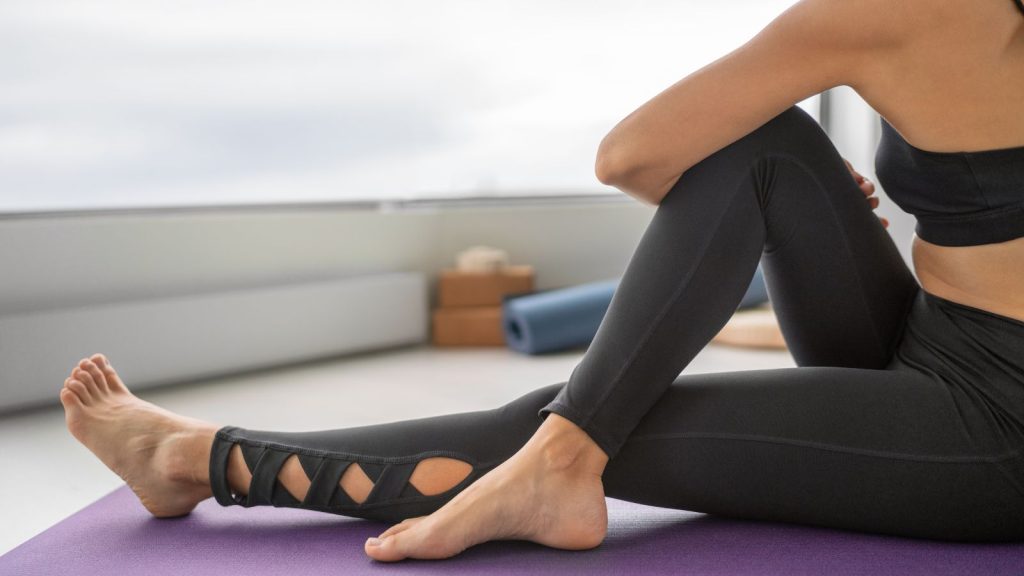
While seated, cross one ankle over the opposite knee. Gently lean forward until you feel a stretch in your hip. Hold for 20 seconds, then switch sides. This stretch can help alleviate lower back pain and sciatica. To intensify the stretch, gently press down on the knee of the crossed leg.
Chin Tuck

Sit up straight and gently tuck your chin down and back, as if you’re trying to make a double chin. Hold for 5 seconds, then release. Repeat 10 times. This exercise helps correct forward head posture, common in those who spend a lot of time looking at screens. Try to perform this exercise whenever you catch yourself slouching or leaning forward.
Silent Marching
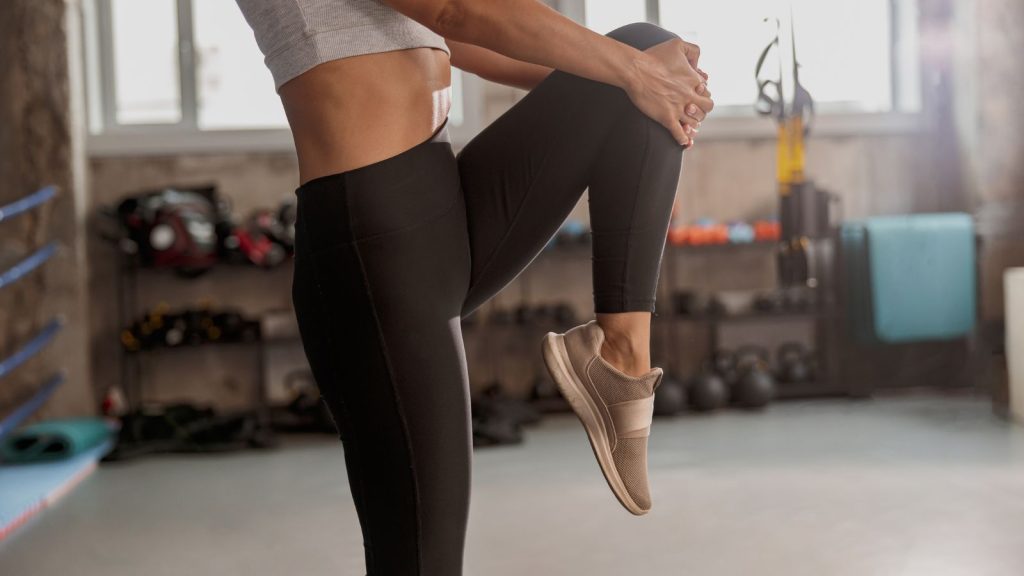
While standing or sitting, lift your knees up towards your chest, alternating legs as if marching in place. Do this for 30 seconds. This subtle cardio exercise can boost your heart rate and energy levels without disturbing others. For an added challenge, try incorporating arm movements as if you’re power walking.
Finger Stretches
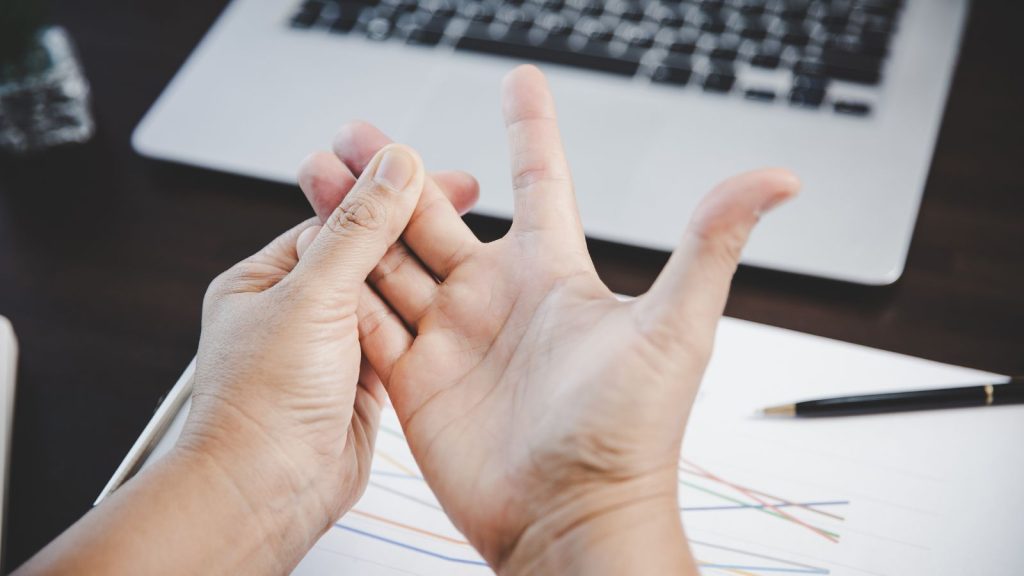
Spread your fingers as wide as possible, hold for 5 seconds, then make a fist. Repeat 10 times. This exercise improves finger flexibility and can help prevent stiffness associated with typing and writing. For variety, try touching each finger to your thumb in sequence, then reversing the order.
Seated Cat-Cow

Sitting upright, place your hands on your knees. As you inhale, arch your back and look up. As you exhale, round your spine and tuck your chin to your chest. Repeat 10 times. This gentle spinal movement can help relieve back tension and improve posture. Focus on synchronizing your breath with the movement for a mini mindfulness practice.
18 Everyday Things Amish Women Aren’t Allowed to Do

The Amish culture is known for its simple way of life and adherence to traditional values. While this lifestyle may seem appealing to some, there are certain restrictions that Amish women face that most modern women do not. Take a look at these things that we take for granted that are off-limits to Amish women.
Read More: 18 Everyday Things Amish Women Aren’t Allowed to Do
Katy Willis is a writer, master herbalist, master gardener, and certified canine nutritionist who has been writing since 2002. She’s finds joy in learning new and interesting things, and finds history, science, and nature endlessly fascinating.
